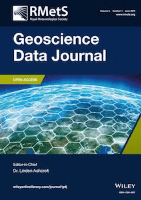
Geoscience Data Journal
metrics 2024
Driving forward the conversation on Earth's future with data.
Introduction
Geoscience Data Journal is a pioneering platform published by Wiley, dedicated to the dissemination of high-quality geoscience data. Established as an Open Access journal since 2014, it provides a crucial resource for researchers, professionals, and students interested in the diverse fields of Earth and Planetary Sciences. With an impressive impact factor that places it in the Q2 category of Earth and Planetary Sciences for 2023, the journal ranks 33rd out of 195 in its category according to Scopus, situating it in the 83rd percentile of similar publications. Emphasizing transparency and accessibility, the journal encourages the sharing of data related to the geology, geophysics, and the evolving climate, driving forward the global conversation on sustainability and environmental stewardship. The journal's ongoing publication from 2015 to 2024 underscores its commitment to advancing research and knowledge in geoscience, making it an invaluable asset for anyone engaged in this dynamic and impactful field.
Metrics 2024
 0.44
0.44 3.30
3.30 4.00
4.00 19
19Metrics History
Rank 2024
Scopus
IF (Web Of Science)
JCI (Web Of Science)
Quartile History
Similar Journals
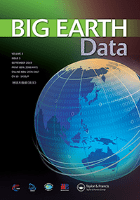
Big Earth Data
Empowering Research with Transformative Earth Data SolutionsBig Earth Data is a prestigious open-access journal that has been at the forefront of advancing research in the intersection of earth science and computer technology since its inception in 2017. Published by TAYLOR & FRANCIS LTD in the United Kingdom, this journal is dedicated to disseminating groundbreaking findings and innovative methodologies in the fields of Earth and Planetary Sciences and Computer Science Applications. With a commendable impact factor and an impressive positioning in the Scopus rankings—claiming Q1 status in Computers in Earth Sciences and Q2 in Computer Science Applications—it serves as a vital resource for researchers, professionals, and students alike. The journal encourages submissions that explore the integration of big data technologies in managing, analyzing, and visualizing earth-related data, thereby fostering interdisciplinary collaboration. Since embracing its open-access model, Big Earth Data has enhanced the accessibility of high-quality research, promoting a broader dialogue in the scientific community and contributing to informed decision-making in global environmental challenges.
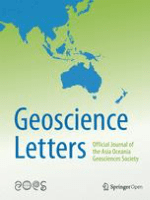
Geoscience Letters
Innovating Research for Global ImpactGeoscience Letters, published by Springer, is a prominent open-access journal in the field of Earth and Planetary Sciences, recognized for its dedication to advancing knowledge and research in this vital area of study. With a reported impact factor that reflects its esteemed position—ranking in the Q1 quartile of Earth and Planetary Sciences, particularly as the journal ranks #48 out of 195 in the general category according to Scopus—the journal serves as a vital resource for researchers, professionals, and students. Since its inception in 2014, Geoscience Letters has facilitated the dissemination of high-quality research and critical insights, aiming to bridge the gap between scientific discovery and societal needs. Its commitment to open access ensures that the latest findings are readily available to a global audience, thus enhancing collaboration and innovation within the geosciences community.

Bioinformatics Advances
Charting New Territories in BioinformaticsBioinformatics Advances, published by Oxford University Press, is an esteemed academic journal that serves as a vital platform for the dissemination of innovative research in the rapidly evolving fields of bioinformatics and computational biology. With a promising E-ISSN of 2635-0041, this journal has made significant strides since its inception in 2021, achieving a commendable Q1 ranking in both the Computer Science Applications and Genetics categories, alongside respectable Q2 rankings in Molecular Biology and Structural Biology as of 2023. Though currently not an open-access publication, its critical insights cater to an audience keen on advancing knowledge and technology in genomic studies and data analytics. The journal emphasizes high-quality research and aims to facilitate the integration of computational techniques within biological sciences, making it an essential resource for researchers, professionals, and students alike who seek to stay at the forefront of bioinformatics advancements.
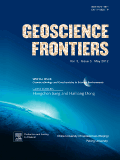
Geoscience Frontiers
Unlocking the Secrets of Our Dynamic EarthGeoscience Frontiers is a premier open-access journal that has been at the forefront of disseminating impactful research in the field of Earth and Planetary Sciences since its inception in 2010. Published by China University of Geosciences, Beijing, this journal operates from the Netherlands and has gained recognition for its rigorous peer-review process and high standards of scholarship, earning a distinguished position as Q1 in the Earth and Planetary Sciences category. With a Scopus ranking of 5 out of 195, placing it in the 97th percentile, it reflects the journal's commitment to addressing global geological challenges and advancing our understanding of the Earth’s dynamic systems. As an open-access platform, Geoscience Frontiers ensures that vital research is widely accessible, fostering collaboration and innovation among researchers, professionals, and students alike. By providing a forum for cutting-edge discoveries and theories, the journal plays a critical role in shaping the future of geoscientific research and education.
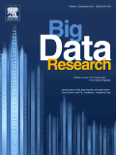
Big Data Research
Unlocking the potential of big data.Big Data Research, published by Elsevier, is a leading academic journal dedicated to the exploration and advancement of Big Data methodologies and technologies. With an ISSN of 2214-5796, and a commendable impact reflected in its Scopus rankings—ranking Q2 in Computer Science Applications and Q1 in Information Systems—this journal offers a prominent platform for researchers and practitioners to share innovative findings in the realm of data science, analytics, and management. Since its inception in 2014, Big Data Research has fostered a multidisciplinary approach, addressing cutting-edge topics crucial for both academic inquiry and real-world applications. The journal's objectives include advancing the understanding of data-intensive systems, promoting essential methodologies for big data analytics, and enhancing data-driven decision-making processes across various industries. As an open access journal, Big Data Research is committed to disseminating knowledge widely, allowing researchers, professionals, and students to stay at the forefront of developments in this fast-evolving field. Its influence in the academic community is further underscored by a strong commitment to quality and relevance, making it an essential resource for anyone interested in the transformative power of big data.

Journal of Integrative Bioinformatics
Unifying Disciplines to Decode Complex Biomedical ChallengesJournal of Integrative Bioinformatics, published by WALTER DE GRUYTER GMBH, is a leading open-access journal that has been at the forefront of the field since its inception in 2004. With an E-ISSN of 1613-4516, it serves as a crucial platform for researchers engaged in the interdisciplinary study of bioinformatics, blending insights from biology, computer science, and mathematics. Based in Germany, the journal is recognized for its impact in the realm of general medicine, boasting a Scopus rank of #172 out of 636 and placing in the 73rd percentile of its category. The journal continuously strives to disseminate high-quality research contributions that unify experimental and computational approaches to address complex biomedical questions. Targeted towards academics, professionals, and students alike, the Journal of Integrative Bioinformatics provides essential access to innovative research that enhances our understanding of integrative methodologies in medicine and beyond, especially with converged years spanning from 2008 to 2024.

Journal of Official Statistics
Shaping the Future of Official StatisticsThe Journal of Official Statistics, published by SAGE Publications Inc, is a premier open-access journal that has been fostering advancements in the field of statistics since its inception. With its focus on disseminating high-quality research from 1986 to present, this journal provides a vital platform for statistical practices, innovations, and methodologies applicable to various domains, including governmental and organizational data analysis. Recognized as a Q2 journal in the Statistics and Probability category with a Scopus ranking of #143 out of 278, the Journal of Official Statistics boasts a significant impact in informing statisticians and practitioners alike. Located in Sweden, this journal has embraced open access since 2013, ensuring that its comprehensive and research-driven content is accessible to a global audience. Whether you are a researcher, professional, or student, this journal serves as an essential resource for staying informed about the latest trends and discussions in the official statistical community.

Boletim de Ciencias Geodesicas
Connecting Researchers with Groundbreaking Geodetic InsightsBoletim de Ciências Geodésicas is an esteemed academic journal published by the Universidade Federal do Paraná within its Centro Politécnico. Focused on the dynamic field of Earth and Planetary Sciences, this Open Access journal has been a pivotal resource since 1997, fostering the dissemination of critical research and innovative methodologies. With an impact factor indicative of its relevance in the discipline, Boletim de Ciências Geodésicas ranks in the Q3 quartile for Earth and Planetary Sciences as of 2023, showcasing its commitment to quality scholarship in a competitive field. Researchers and students alike will benefit from access to cutting-edge findings, given its broad scope that encompasses various aspects of geodesy and related sciences. The journal's convergence of research from 2005 to 2024 ensures that it remains at the forefront of emerging trends and fundamental developments in the discipline, further enhancing its esteemed reputation in the academic community.

Geophysics and Geophysical Exploration
Transforming Geophysical Understanding for a Sustainable FutureGeophysics and Geophysical Exploration is a prestigious journal dedicated to advancing the fields of geophysics and geophysical exploration. Published by the Korean Society of Earth & Exploration Geophysicists, this journal serves as a vital platform for researchers, professionals, and students to share innovative findings and developments in geophysical methods and technologies. The journal covers a broad range of topics including but not limited to seismic analysis, subsurface modeling, and remote sensing techniques, aimed at addressing the complex challenges in Earth science exploration. Although it does not currently offer open access options, the journal maintains rigorous peer-review standards, ensuring high-quality and impactful research contributions. With its commitment to fostering knowledge exchange in the geophysical community, Geophysics and Geophysical Exploration plays a critical role in enhancing our understanding of the Earth, making it an essential resource for those interested in geoscience and related fields.

International Journal of Research & Method in Education
Shaping the future of education through scholarly research.The International Journal of Research & Method in Education, published by Routledge Journals, Taylor & Francis Ltd, stands at the forefront of educational research, providing a platform for innovative methodologies and critical discussions within the field. As reflected in its prestigious Q1 category ranking in education for 2023 and its impressive Scopus rank of 301 out of 1543, the journal is recognized for its influential contributions to educational theory and practice. With a focus on rigorously assessing research methods and promoting evidence-based learning, this journal addresses a wide array of topics relevant to researchers, educators, and policymakers. Although it does not currently offer open access options, its extensive reach and robust peer review process ensure that published articles reflect the highest standards of scholarship. Researchers and professionals alike will find invaluable insights that advance understanding and application in the ever-evolving landscape of education.